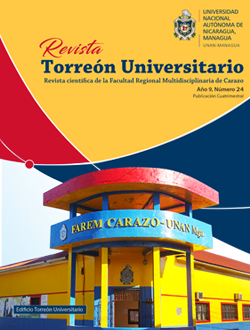¿Qué es el Fondo para Proyectos de Investigación (FPI) en la UNAN-Managua?
DOI:
https://doi.org/10.5377/torreon.v9i24.9718Palabras clave:
fondo para proyectos de investigación, investigación, UNAN-ManaguaResumen
Las instituciones nicaragüenses de educación superior tienen como uno de sus objetivos esenciales desarrollar y fomentar la investigación científica como una estrategia fundamental para contribuir a la transformación de la sociedad. Este artículo describe el papel que ha desempeñado el Fondo para Proyectos de Investigación (FPI) de la Universidad Nacional Autónoma de Nicaragua, Managua (UNAN-Managua) para promover e incrementar la investigación en la Universidad. La población objeto de estudio estuvo compuesta por los proyectos que aplicaron y los adjudicados en las cuatro convocatorias del FPI (2015-2017, 2016-2018, 2017-2019, 2018-2020). De 233 proyectos recibidos se financiaron 127, de los cuales 66 proyectos se inscriben en el área investigativa de cambio climático, gestión ambiental y manejo de los recursos naturales. La modalidad con el mayor número de proyectos financiados fue la de Docentes-Investigadores. Las principales limitaciones han sido la tardanza de las rendiciones financieras, adquisición de insumos y la demora para la entrega de productos, sin embargo, el FPI se ha convertido en un instrumento importante para el fortalecimiento de la investigación en la UNAN-Managua, en correspondencia con los compromisos adquiridos en el Plan Nacional de Desarrollo Humano (PNDH) y los Objetivos de Desarrollo Sostenible (ODS).
Descargas
Descargas
Publicado
Número
Sección
Licencia
The authors who publish in this journal agree to the following terms.
- The author or authors of the articles, essays or research grant the National Autonomous University of Nicaragua, Managua (UNAN-Managua) the editing rights (copyright) of the submitted work, therefore the University has the exclusive right to publish the article for the entire copyright period.
- These copyrights/authors authorize Torreón Universitario Magazine and the University to edit and disseminate/publish the article in said Magazine, including printed and electronic reproduction, storage, retrieval and any other type of publication, and sources of secondary information as services. of summaries and databases, they also empower it to protect the article against unauthorized use for dissemination by printed or electronic media (PDF, HTML, EPUB, XML or others).
License for use of content
The magazine uses the Creative Commons Attribution-NonCommercial-NoDerivs 4.0 International License.
Under this statement:

This journal is licensed under a Creative Commons Attribution-NonCommercial-NoDerivatives 4.0 International License. It can be copied, distributed and transmitted publicly as long as the author and source are cited (Revista Torreón Universitario), it should not be modified or used for any commercial purpose. The full license can be found at http://creativecommons.org/licenses/by-nc-nd/4.0/.



